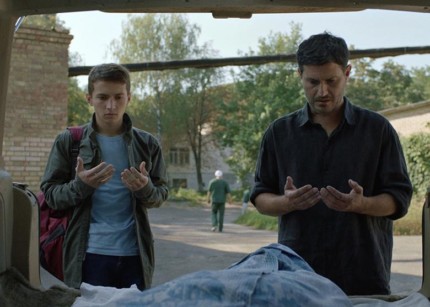
Подаємо рецензію Bénédicte Prot, Cineuropa на фільм Нарімана Алієва «Додому».
The feature debut from Ukrainian filmmaker Nariman Aliev, shaped like a funeral procession, is an allegory of the fate of the Tatar people, reduced to a state of vagrancy
In cinema, Crimea often evokes inhospitable, vast and empty expanses of land, and the kind of tales that fit that territory. The feature debut from Ukrainian filmmaker Nariman Aliev, presented in the Un Certain Regard section of the 72nd Cannes Film Festival, is no exception. But the entirety of Homeward unfolds outside of this republic, part of the Russian Federation, and on the road towards it more specifically. Indeed, the path we will follow here is going to be slow and laborious, on treacherous terrain.
How could it be otherwise when a film begins in a morgue, where a father, Mustafa (Akhtem Seitablaev) and his youngest son Alim (Remzi Bilyalov) are waiting under a flickering neon to recover the body of the family’s eldest son. The latter was killed in combat in Donbass, where he had gone as a volunteer. After Mustafa’s overwhelming rush of emotions when he sees the livid corpse of his child, pierced with bullets; after a few bills slipped into the right hands let them cross the hurdle of administration; he buries his emotions deep inside him so that he can do, with utmost discipline, the duty imposed on him by Muslim religion and Tatar tradition. The father and his youngest son hit the road in silence, Mustafa striving to return the body in the trunk to its native land as soon as possible to properly perform all the mandatory rituals.
As the duo faces obstacles after obstacles while the cadavre begins to decompose, what comes through this extremely long and perilous journey — from which the deceased’s (Ukrainian) fiancée is categorically excluded — is the tenacity of the father, ill but determined to hold on until the end. From the film’s very first scenes, Alim has no choice but to comply with this iron resolve, though he may not always understand it. It sometimes comes across as sheer stubbornness, and Aliev does indeed question the value in upholding tradition at all costs. But the function of this journey is also to make us deeply understand what it represents, and why it is so important to this family.
Indeed, this family’s fate coincides with that of the entire Tatar people, deported en masse by Stalin in 1944, in such a way that when the Iron Curtain fell, there was no Tatar in Crimea any longer. Neither Kiev nor the Slavic occupants living in Crimea helped them in their attempts to return to their land after the fall of the USSR, and for many such as Mustafa’s father, these attempts failed and turned them into stateless people, living so closely to their land.
From this allegorical work, filmed in a sober and classical manner, a sad and lacklustre beauty emerges, echoing the situation of this people that is so rarely talked about. Through Mustafa’s painful task, Aliev lets us hear their heartbreaking lament.
Homeward was produced by Ukrainian company Limelite. Foreign sales of the film are handled by Wild Bunch.
Bénédicte Prot, Cineuropa, 24 травня 2019 року
